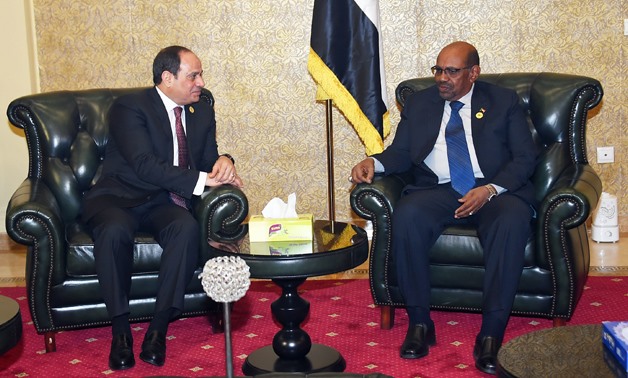
President Abdel Fatah al-Sisi (L) and Sudanese President Omar al-Beshir had held a meeting on January 28, 2018, before the 30th African Union (AU) Summit kicked off in the Ethiopian capital Addis Ababa – Press Photo
CAIRO – 28 January 2018: Egypt and Sudan leaders agreed on forming a joint ministerial commission comprising the foreign ministers and intelligence heads of both countries to handle bilateral matters and issues facing the two countries. It will be summoned soon to put into effect the plans agreed upon.
Presidents Abdel Fatah al-Sisi and Omar al-Bashir of Sudan had held a meeting Saturday before the 30th African Union (AU) Summit that kicked off in the Ethiopian capital Addis Ababa.
Sudan’s Ambassador to Cairo Abdel Mahmoud Abdel Halim described the meeting as very positive as it is reflecting a sense of transparency between both leaders, which would take relations to a new level to be based on mutual interests rather than emotions.
The ambassador stated that the summit discussed the current status of bilateral relations and the importance of eliminating any tensions affecting them.
Abdel Halim called for media outlets in both countries to get over negative aspects in the bilateral ties and help improve relations. He added that the date of his return to Egypt would be determined after the 30th AU Summit.
Earlier in January, Sudan has denied media reports stating that its ambassador to Cairo said Khartoum would “escalate” the situation against Egypt, few days after being summoned to his country for consultation.
“The Sudanese Foreign Ministry has totally denied any remarks were given by its ambassador to Egypt…The ambassador was attending a social event and he talked about the (diplomatic) meaning of summoning an ambassador,” the Sudanese Foreign Ministry said in a statement on Saturday.
“Sudan is keen on achieving stability and peace in both countries,” the statement added, noting that the ambassador was quoted out of context.
Russia Today reported that Abdel Halim told Sudanese reporters that Khartoum “has taken tougher steps against Cairo and new development will take place in the coming few days and will be more violent.”
“We are at the beginning of our diplomatic process, which starts with summoning the ambassador for consultation and then withdrawing the ambassador…and third, dismissing the ambassador of the concerned country. Fourth, boycotting the diplomatic ties and fifth, declaring war,” stated an Egyptian government official.
On January 4, Abdel-Halim was withdrawn for consultation, according to the Egyptian Foreign Ministry, which replied that Cairo was evaluating the situation in order to act accordingly.
Two days ago, Ibrahim Mahmoud, assistant of the Sudanese president, said that his country “faces (potential) military threats” from Egypt and Eritrea after claiming that there have been “military movements from Cairo and Asmara along the Sudanese eastern borders,” BBC reported. However, Eritrea has totally denied any Egyptian military movements, saying such remarks are “groundless.”
In a phone call to Sabahak Masry talk show on MBC channel on Monday, Egyptian Ambassador to Eritrea Yasser Hashem stated that Egypt has no military bases in Eritrea or any other country.
Sudan claims that it has sovereignty over Halaib and Shalateen triangle, which is located within Egyptian territories. Halaib and Shalateen, or the Halaib Triangle, is an area of land measuring 20,580 square kilometers, located on the Egyptian-Sudanese border on the Red Sea coast. It is part of the Red Sea governorate and consists of three major towns.
The area belongs to Egypt politically and administratively, but has been one of the major sticking points in Egyptian-Sudanese relations since the demarcation of borders between the two countries that took place during the British occupation of Egypt in 1899, at a time when Sudan was part of the Egyptian Kingdom.
Recently, the bilateral relations tensed because of the controversial Ethiopian Renaissance Dam. Sudanese media claimed that Egypt has sought to exclude Sudan from the tripartite talks with Ethiopia. On January 8, Foreign Minister Sameh Shoukry stressed that Egypt did not ask Ethiopia to exclude Sudan from negotiations.
Egypt has voiced its concern over Ethiopia’s dam construction, as it would affect Egypt’s 55 billion cubic meter share of the Nile water. However, Addis Ababa sees that the dam is necessary for its development and would not negatively affect the downstream countries (Egypt and Sudan).
Additional contribution by

Comments
Leave a Comment